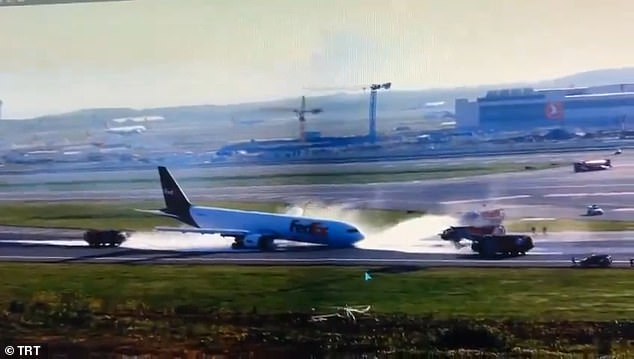Terrifying moment Boeing 767’s nose smashes into runway as the FedEx plane makes emergency landing without a landing gear in Turkey
A Boeing 767 cargo plane crashed on landing in Turkey this morning after its landing gear failed as it touched down.
The flight, operated by US postal service FedEx, took off from Charles de Gaulle Airport in Paris early this morning and was heading to Istanbul when the pilot realized the landing gear was malfunctioning.
Shocking footage showed the moment the plane tried to make an emergency landing, slamming into the runway and scraping its nose against the concrete.
Sparks flew from the plane’s ruptured fuselage as it crunched across the tarmac, billowing smoke from behind.
Fortunately, firefighters and rescue teams were already waiting at the scene, with the Turkish Ministry of Transport having sent emergency teams as soon as it learned that the pilot’s landing gear had failed.
First responders flocked to surround the plane as it came to a stop and immediately doused it with firefighting foam to prevent a possible fire.
The crash will only worsen Boeing’s woes after the U.S. Federal Aviation Administration said Monday it has opened an investigation into the company after workers at a South Carolina factory falsified inspection records of certain 787 planes.
Shocking footage showed the moment the plane tried to make an emergency landing, ending up on the runway and scraping its nose on the concrete.

The aircraft was doused with firefighting foam when it came to a stop
No one was injured in today’s incident and the crew safely evacuated the plane, said Abdulkadir Uraloglu, Turkey’s Minister of Transport and Infrastructure.
The runway where the plane landed was closed while the plane was removed, he said.
Boeing is already under intense scrutiny amid a series of accidents and controversies over suspected quality control problems.
In an email to Boeing employees in South Carolina on April 29, Scott Stocker, who heads the 787 program, said an employee noticed an “irregularity” in a required test of the wing-to-body connection and this reported to his manager.
“After receiving the report, we quickly reviewed the matter and learned that several people had violated company policy by not performing a required test but recording the work as completed,” Stocker wrote.
Boeing has notified the FAA and is taking “swift and serious corrective action with multiple teammates,” Stocker said.
No aircraft have been removed from service, but if the out-of-service test has to be conducted on aircraft, deliveries of jets still being built at the final assembly plant in North Charleston, South Carolina, will be delayed.
Boeing must also create a plan to address planes already flying, the FAA said.
The 787 is a twin-aisle aircraft that debuted in 2011 and is mainly used for long international flights.
“The company voluntarily advised us in April that it may not have completed required inspections to confirm adequate bonding and grounding where the wings join the fuselage of certain 787 Dreamliner aircraft,” the agency said in a written statement.
“The FAA is investigating whether Boeing completed inspections and whether company employees may have falsified aircraft records.”
The company has been under intense pressure since a door plug blew out of a Boeing 737 Max during an Alaska Airlines flight in January, leaving a gaping hole in the plane.
The accident reversed the progress Boeing appeared to be making in recovering from two fatal Max jet crashes in 2018 and 2019.
The crashes in Indonesia and Ethiopia, which killed 346 people, are also back in the spotlight.
The families of some of the victims have urged the Justice Department to revive a criminal fraud complaint against the company by finding that Boeing’s continued missteps violated the terms of a deferred prosecution agreement 2021.
In April, a Boeing whistleblower, Sam Salehpour, testified at a Congressional hearing that the company had taken production shortcuts to produce 787s as quickly as possible; his allegations were not directly related to those the company disclosed to the FAA last month. The company has denied Salehpour’s claims.
In his email, Stocker praised the employee who came forward and shared what he saw: “I wanted to personally thank and commend that teammate for doing the right thing. It is critical that each of us speak up when we see something that may not look right or needs attention.”
